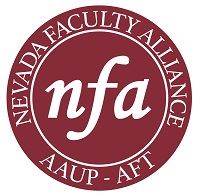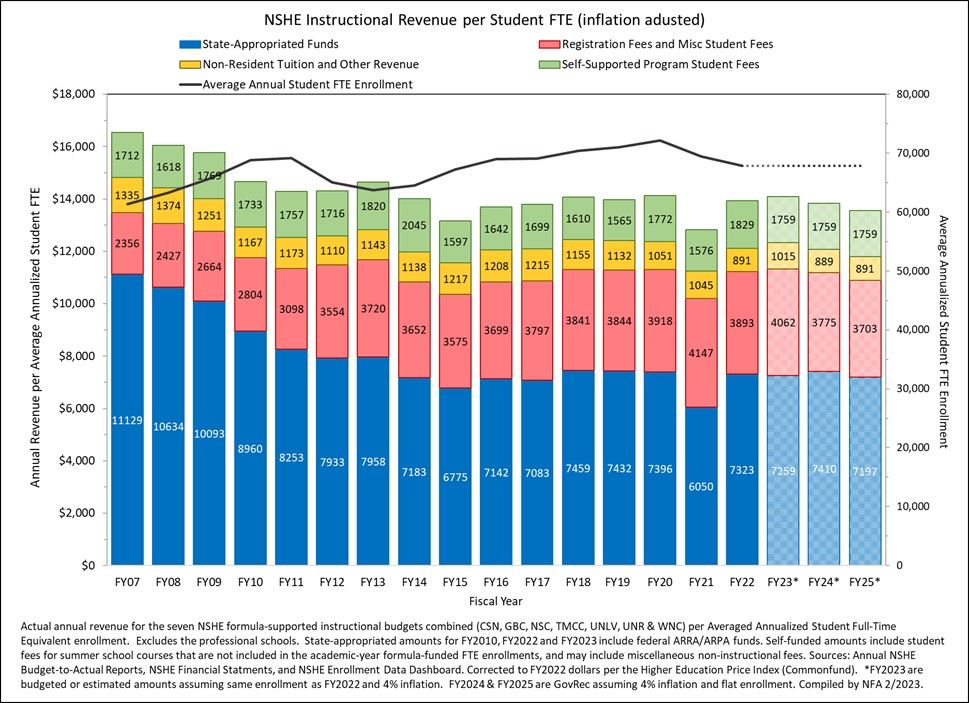
Public Comment, Joint Senate Finance and Assembly Ways & Means Committees, 2/21/2023
by Kent Ervin, State President, Nevada Faculty Alliance
Re: Nevada System of Higher Education Budget
The Nevada Faculty Alliance is the independent statewide association of professional employees at NSHE. Along with our national partners, the American Association of University Professors and the American Federation of Teachers, we work to advance higher education for the common good.
Higher education fosters a responsible citizenry, promotes upward social and economic mobility, and trains the workforce for Nevada’s economic advancement. Our public colleges and universities are the talent pathway for workforce development. That includes not only career and technical training for trades, but also the professional workforce education for Nevada’s future—teachers, nurses, doctors, engineers, scientists, accountants, managers, policy-makers, journalists, writers, and so forth.
There has been a long-term trend, both nationally and in Nevada, of lower state support for public higher education and higher student fees and tuition. Between FY2007 and FY2022 in Nevada, state-appropriated funding per student FTE (full-time-equivalent) declined by 34% after inflation (including the federal ARPA funds used to restore positions in FY2022 ). During the same period, resident student fees per student FTE increased 65% above inflation. (Please see the chart of state and student revenues per student FTE on page 2.) The contribution to the total cost from the state per student has declined from about two-thirds to one-half.
The Governor’s recommended budget brings NSHE’s state-appropriated base budget back to FY2019 levels, which bakes in those long-term declines. It restores the 12% cuts to operating budgets in the current biennium. The additional funding for graduate teaching assistantships is important—their current stipends are below subsistence levels. We also appreciate the one-time funding to cover pandemic-related enrollment declines at CSN, GBC, and TMCC. However, we have to point out that the operating budget does not address the high inflation over the past two years, so we will still be stretching to do more with less.
We are encouraged that the Governor has proposed a study of the funding formula. With a $5M price tag, the study should not only study the costs of providing courses, but also the support that today’s students need and the resources required to provide higher education for the common good and Nevada’s economic future.
Thank you.

On an inflation-adjusted basis, state-appropriated funding per full-time-equivalent (FTE) student fell by 34% from FY2007 to FY2022, while resident registration fees rose 65% above inflation. Revenues per student FTE from non-resident tuition and self-supported program fees were about flat over the same period after inflation.
###
The Nevada Faculty Alliance is the statewide independent association of professional employees at the colleges and universities of the Nevada System of Higher Education. The NFA is affiliated with the American Association of University Professors and the American Federation of Teachers/AFL-CIO, which represent over 300,000 higher education professionals in North America. The NFA advocates for higher education as a common good, academic freedom, and improving the working conditions of NSHE professional employees.
Contact: Kent Ervin, NFA State President, kent.ervin@nevadafacultyalliance.org, 775-453-6837